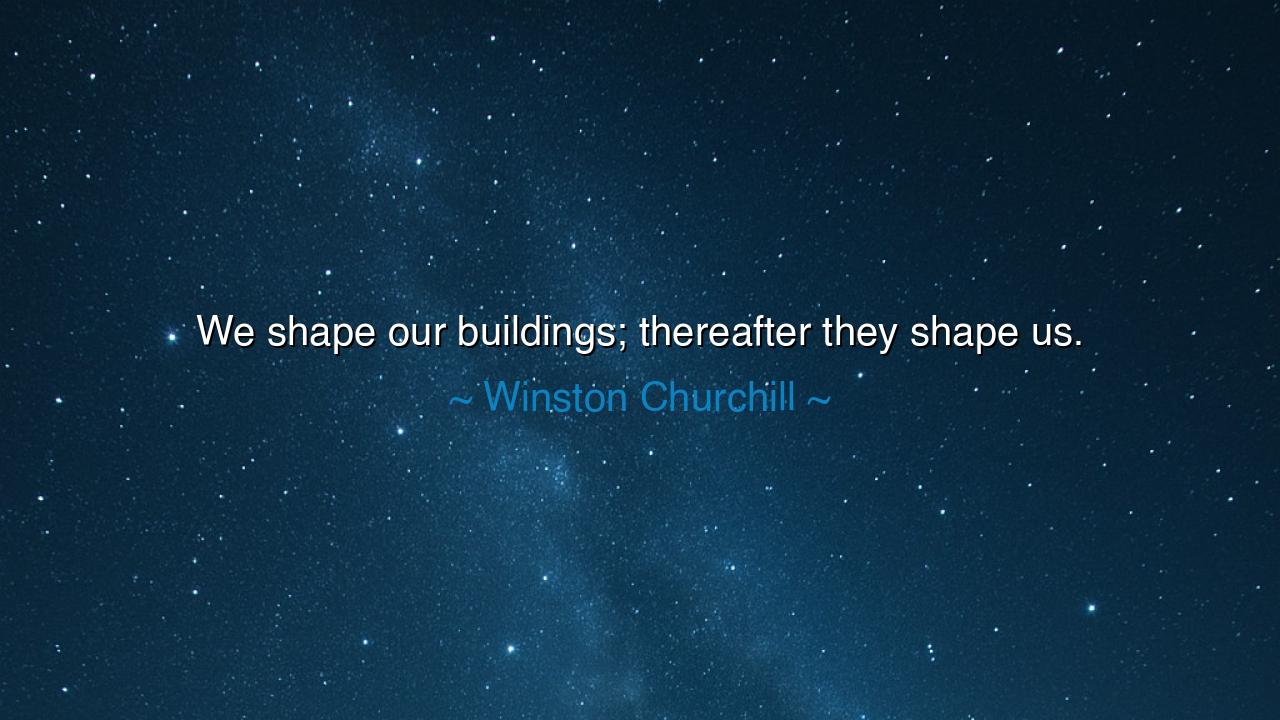
We shape our buildings; thereafter they shape us.






Host: The city was still — suspended in that quiet hour between night and dawn, when the skyscrapers glowed faintly against the soft bruised-blue of morning. Their windows, like a thousand tired eyes, reflected the last fragments of moonlight. The streets below were slick from rain, every puddle holding a fractured piece of the skyline, a reminder that even glass remembers.
Inside one of those tall buildings, on the 40th floor, the air smelled faintly of dust, concrete, and coffee gone cold. The office was empty except for two people.
Jack stood near the large glass window, staring down at the awakening city. He looked smaller than usual — not because of his frame, but because of what loomed around him: walls of steel, glass, and history.
Jeeny sat on the edge of a long conference table, one leg crossed, a rolled-up set of blueprints beside her. Her hands were dusted with graphite. Her eyes, dark and perceptive, caught the faint reflection of dawn breaking behind him.
Host: The light began to spill through the blinds, slow and deliberate — like a truth the world wasn’t quite ready to hear.
Jeeny: “Winston Churchill once said, ‘We shape our buildings; thereafter they shape us.’”
Jack: (smiling faintly) “Trust a politician to understand architecture better than morality.”
Jeeny: “Maybe he understood they’re the same thing.”
Jack: “How so?”
Jeeny: “Both start with intention and end with consequence.”
Host: The hum of the city below began to rise — traffic, horns, footsteps. The glass vibrated faintly, carrying the pulse of millions living inside the structures they’d built.
Jack: “You think buildings really shape us? Or do we just project ourselves onto them?”
Jeeny: “Both. We build walls to protect ourselves, and then we forget how to live without them.”
Jack: (turning toward her) “You mean the literal kind or the emotional kind?”
Jeeny: “You know the answer to that.”
Jack: “Maybe. But I like to think a city’s just a reflection of its people. Look at New York — restless, ambitious, loud. Look at Venice — fragile and timeless. Or look at this one…” (gestures out the window) “—steel bones and glass skin. It’s proud, but it’s hollow.”
Jeeny: “And who built it?”
Jack: “We did.”
Jeeny: “Exactly. The buildings tell on us.”
Host: A shaft of sunlight struck the floor, inching toward them like a question that demanded to be faced.
Jeeny: “Churchill knew what he was saying. After the war, Britain had to rebuild — not just its homes, but its sense of self. He understood that the kind of world you construct will one day dictate the kind of people who live in it.”
Jack: “So architecture is destiny.”
Jeeny: “In a way, yes. You build cold towers, you get colder people. You build open squares, people meet. The environment becomes the teacher.”
Jack: (quietly) “Then what does this place teach?”
Jeeny: (looking around the sterile office) “Efficiency without empathy. Transparency without warmth. Progress without poetry.”
Jack: (laughs softly) “Sounds about right.”
Host: The light grew stronger now, washing the walls in pale gold. The glass reflected their silhouettes, two figures caught between what was built and what was lost.
Jeeny: “You ever notice how the old buildings breathe differently? You walk into a church, and the silence has texture. A farmhouse — it smells like patience. Even the creak of an old floorboard sounds human.”
Jack: “Because they were built by hands, not machines.”
Jeeny: “Yes. And with intention, not just instruction. Every curve, every corner meant something. Now everything’s efficient, replicable — soulless.”
Jack: “Soulless sells.”
Jeeny: “And so we live in cages made of convenience.”
Host: A plane crossed overhead, its faint shadow gliding across the office wall. Jack watched it fade, a quiet metaphor passing through steel.
Jack: “You know, when I was younger, I used to dream of these towers. Thought success meant touching the sky. Now that I’m here…” (he glances around) “…I just feel small.”
Jeeny: “That’s what Churchill meant, Jack. You shape something to elevate you — and in the end, it dwarfs you.”
Jack: “Then maybe we built wrong.”
Jeeny: “No. Maybe we just forgot why we started building at all.”
Host: A soft beep from the elevator echoed down the hallway — the sound of routine returning. The office lights flickered fully awake, washing away the intimacy of the moment.
Jack: “You think we can fix it?”
Jeeny: “What, the city?”
Jack: “Ourselves.”
Jeeny: (after a pause) “Maybe. But only if we start designing differently.”
Jack: “Less glass?”
Jeeny: “More humanity.”
Host: The sun had now cleared the horizon completely, flooding the room with light. Dust motes danced in it like tiny reminders of imperfection — proof that even sterile spaces couldn’t stay pure for long.
Jack: (softly) “Maybe buildings aren’t just where we live. Maybe they’re who we become.”
Jeeny: “And maybe the way we build them — strong, fragile, closed, open — is just a reflection of how we build each other.”
Jack: (smiling faintly) “Then I guess it’s time we learned to leave a few windows open.”
Jeeny: “Yes. So the light can come in — and the people can breathe.”
Host: The camera panned back — through the wide office windows, out into the city skyline. The light glimmered off the skyscrapers, each one different yet bound by the same air, the same sun, the same unseen human ache to leave something behind.
And as the city stretched awake beneath the rising day, Winston Churchill’s words resonated — not as history, but as prophecy:
“We shape our buildings; thereafter they shape us.”
Host: Because every wall we raise
becomes a mirror.
Every window we open
invites both light and truth.
And every city,
like every soul,
is just a collection of choices
trying to stand tall
without forgetting how to feel.






AAdministratorAdministrator
Welcome, honored guests. Please leave a comment, we will respond soon